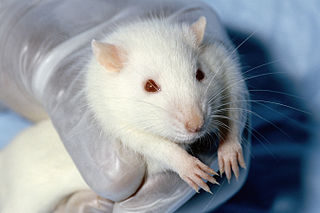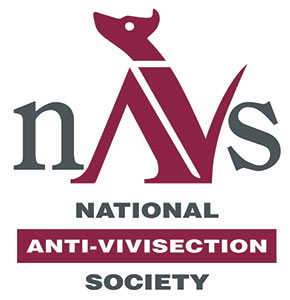
In the animal rights movement, cruelty-free is a label for products or activities that do not harm or kill animals anywhere in the world. Products tested on animals or made from animals are not considered cruelty-free, since these tests are often painful and cause the suffering and death of millions of animals every year.
Cruelty Free International is a British animal protection and advocacy group that campaigns for the abolition of all animal experiments. They organise certification of cruelty-free products which are marked with the symbol of a leaping bunny.
Stop Huntingdon Animal Cruelty (SHAC) was an international animal rights campaign to close down Huntingdon Life Sciences (HLS), Europe's largest contract animal-testing laboratory. HLS tests medical and non-medical substances on around 75,000 animals every year, from rats to primates. It has been the subject of several major leaks or undercover investigations by activists and reporters since 1989.

Animal Aid is a British animal rights organisation, founded in 1977 by Jean Pink. The group campaigns peacefully against the consumption of animals as food and against animal cruelty such as their use for medical research—and promotes a cruelty-free lifestyle. It also investigates and exposes animal abuse.
Shamrock Farm was the United Kingdom's only non-human primate importation and quarantine centre, located in Small Dole, near Henfield in West Sussex. The centre, owned by Bausch and Lomb and run by Charles River Laboratories, Inc. for Shamrock (GB) Ltd, provided animals to various laboratories and universities for use in animal testing. It was Europe's largest supplier of primates to laboratories, and held up to 350 monkeys at a time.
SPEAK is a British animal rights group working to end animal testing in the UK.

Pro-Test was a British group that promoted and supported animal testing in medical research. It was founded on 29 January 2006 to counter SPEAK, an animal-rights campaign opposing the construction by Oxford University of a biomedical and animal-research facility, which SPEAK believes may include a primate-testing centre. Pro-Test held its first rally on 25 February 2006, attracting hundreds in support of the research facility and opposed by a smaller number of anti-lab demonstrators.

Cambridge University primate experiments came to public attention in 2002 after the publication that year of material from a ten-month undercover investigation in 1998 by the British Union for the Abolition of Vivisection (BUAV). The experiments were being conducted on marmosets, and included the removal of parts of their brains intended to simulate the symptoms of stroke or Parkinson's disease. Some of the research was theoretical, aimed at advancing knowledge of the brain, while some of it was applied.

The People's Petition was an online campaign to express support for medical experimentation using animals in the United Kingdom. Within a year of launch the number of signatures exceeded 21,850 and included Tony Blair, the then-serving Prime Minister.
Gillian Rose Langley is a British scientist and writer who specialises in alternatives to animal testing and animal rights. She was, from 1981 until 2009, the science director of the Dr Hadwen Trust for Humane Research, a medical research charity developing non-animal research techniques. She was an anti-vivisection member of the British government's Animal Procedures Committee for eight years, and has worked as a consultant on non-animal techniques for the European Commission, and for animal protection organizations in Europe and the United States. Between 2010 and 2016 she was a consultant for Humane Society International.

The National Anti-Vivisection Society (NAVS) is an international not-for-profit animal protection group, based in London, working to end animal testing, and focused on the replacement of animals in research with advanced, scientific techniques. Since 2006, the NAVS has operated its international campaigns under the working name Animal Defenders International (ADI), and the two groups now work together under the ADI name.

Experiments involving non-human primates (NHPs) include toxicity testing for medical and non-medical substances; studies of infectious disease, such as HIV and hepatitis; neurological studies; behavior and cognition; reproduction; genetics; and xenotransplantation. Around 65,000 NHPs are used every year in the United States, and around 7,000 across the European Union. Most are purpose-bred, while some are caught in the wild.
Uncaged Campaigns is a Sheffield, UK, based anti-vivisection, not-for-profit organization that advocates for animal rights.
Heather Nicholson is a British animal rights activist.
The campaign against Highgate Rabbit Farm, also known as the Close Highgate Farm campaign, is a series of direct actions by anti-vivisection activists. Highgate Rabbit Farm in Market Rasen, Lincolnshire in England is licensed by the Home Office to breed rabbits and ferrets for animal-testing facilities, including Huntingdon Life Sciences. Actions have included a raid by the Animal Liberation Front (ALF) and an arson claimed by the Militant Forces Against HLS. The ALF raid in 2008 saw 129 rabbits removed and £100,000-worth of damage to property. The campaign has been linked to activists involved in Stop Huntingdon Animal Cruelty (SHAC).
The New England Anti-Vivisection Society (NEAVS) is a national, registered 501(c)(3) nonprofit organization "dedicated to ending the use of animals in research, testing, and science education" and replacing them with "modern alternatives that are ethically, humanely, and scientifically superior."
Animal welfare and rights in Iran is about the laws concerning and treatment of non-human animals in Iran. Iran has no legislation protecting animals from cruelty.
Animal welfare and rights in Switzerland is about the treatment of and laws concerning non-human animals in Switzerland. Switzerland has high levels of animal welfare protection by international standards.

Jake Conroy is an American animal rights activist and vegan who was involved with Stop Huntingdon Animal Cruelty (SHAC), an international campaign to force the closure of Huntingdon Life Sciences (HLS), an animal-testing company based in the UK and US, for which he designed and maintained the SHAC websites. Conroy had previously been a co-founder and activist for an anti-whaling group Ocean Defense International, formally called Sea Defence Alliance, and director of Northwest Animal Rights Network.







